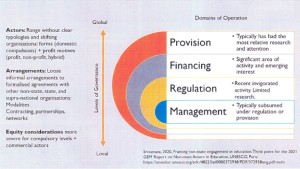Six years ago, a positively gushing August 2017 BBC News story anointed Canada as an “education superpower” on the basis of its recent Program of International Student Assessment (PISA) scores in mathematics, science and reading. Today, after the release of the PISA 2022 assessments, such a claim would be dismissed as preposterous.
On the latest round of tests for 15-year-olds, Canadian students continued to slide in mathematics, reading and science. In Mathematics, the prime focus of the 2022 global assessment, our students dropped again from 512 in 2018 to 497 in 2022, a 35-point decline since 2003. Concerns about taking a “COVID Hit” raised in my November 29 research report, Pandemic Fallout (Cardus Foundation) were borne out in the latest scores.
Our national education agency, the Council of Ministers of Education (CMEC), demonstrated, once again, its tendency to denialism. Crowing about finishing in 9th place in Mathematics means little when we are steadily losing ground to the global leaders, the Asian powerhouses of Singapore, Macau, China (Taipei), Hong Kong, Japan, and Korea, and three fast improving European states, Estonia and Switzerland.
What’s more concerning is that the decline is consistent from 2000 to the present right across the board in reading and science as well as mathematics. Canadian student skills in reading mirror the downward trend, dropping from 524 in 2009 to 507 in 2022, a decline of 17 points. It marginally better in science but still consistent with the pattern of steady decline over the past two decades.
Apologists for Canada’s declining performance are running out of rationalizations. Cherry-picking the mathematics data the best the CMEC communications team could come up with is that some 78 per cent of Canadian students achieved Level 2, signifying that they are functionally numerate. The overall decline in mathematics, reading and science is, rather sadly, explained away because of the “trend seen in the majority of participating countries and economies.”
The PISA 2002 Study report is a rather thick, almost impenetrable, quantitative research study that takes weeks to digest and analyze even for veteran researchers. The Canadian national sub-report, Measuring Up: Canadian Results, OECD PISA 2022, is helpful in summarizing Canadian student performance levels with provincial/territorial breakdowns.
The pandemic fallout was expected, but all the PISA 2022 results did is accentuate and accelerate the longer-term downward slide. It’s serious when the OECD Education tsar, Andreas Schleicher, describes the Canadian student decline in mathematics as a legitimate concern.
Two Canadian provinces, Alberta and Quebec, are responsible for keeping our PISA results from being a “mission-critical crisis.” In Mathematics, Quebec students continue to head the class, scoring 514, some 10 percentage points above Alberta. When it comes to Reading, Alberta leads the pack at 525, albeit down from 532 in 2018. All of the Atlantic provinces tanked on the PISA 2022 tests in Mathematics with Newfoundland (459), New Brunswick (468), and Nova Scotia (470) falling below the OECD average.
Canada’s “learning province,” Ontario is in a slow downward spiral, in spite of its mammoth education budget. On PISA 2022, Ontario students sunk to new lows in Mathematics registering a 495, down 35 points over 20 years. Reading scores in Ontario were better at 512, but some 19 points below 2009. With the Ontario Right to Read reforms underway in K to Grade 3, student reading competencies should be higher from 2028 onward, when that initial cohort turns 15-years-of age.
Learning loss is real and the pandemic generation has not rebounded. What the PISA 2022 student scores reveal is that, in Canada, and worldwide, it there is a “significant learning deficit” and it continues four years after the COVID-19 outbreak and massive school disruption. Recognizing the problem is the first step in shattering the complacency and getting past the “pandemic fatigue.”
Getting our students ‘back-on-track’ will take courageous educational leadership, significant changes in school culture, implementation of the “science of learning” in classrooms, and new policies aimed at reclaiming the minds of students far too absorbed in cyberworlds. It’s all a matter of improving the effectiveness of classroom instruction and being better prepared for the next major disruption in the years ahead.
Why does the public release of PISA student achievement results attract so much global attention? How have the PISA scores in mathematics and reading become proxies for the quality of school systems? Whic are the most important revelations – the actual scores, country rankings, or the longer-term trends? Do we focus too much on the math and reading scores and miss out on some potentially more significant findings buried in the technical reports?






